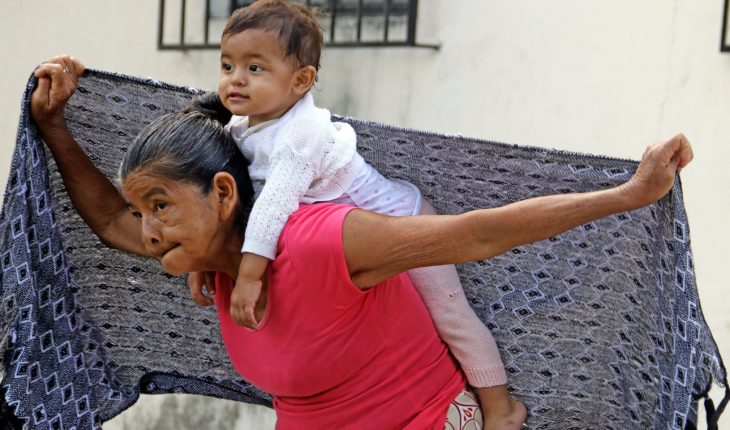grandmothers should not assume the responsibility that is up to the State to provide social security to families and a comprehensive social care early childhood policy, warned experts.
In response to the statement of the Secretary of the Treasury, Carlos Urzúa, with respect to that now parents may pay the grandmothers to take care of grandchildren with the resources that the federal Government gave to the childcare program, specialists consulted pointed out that the work of care is an issue of public character that must be attended by the State, by being the basis of inequality between men and women, and because there has to be a policy of strengthening early childhood development.
According to data of the account satellite of the work not paid from the homes of Mexico, from INEGI, the housework and unpaid care work generates almost a quarter of the national gross domestic product (GDP). Of this figure, women contribute 75% and 25% men. Meanwhile, a study of ECLAC reports that half of women between 20 and 24 years do not seek work outside the home because of the burden that already have with household chores.
This makes the work of care a public issue and as such the State has a responsibility to take care of it, said Christian Mendoza, the Simone de Beauvoir Leadership Institute.
“Why is a public problem? Because caring for girls, children, older adults, people with disabilities, and people sick of chronic and degenerative form they are increasing the workload of care of families. And this burden prevents many times that members of families can play in the public sphere, such as studying, work, participate politically; that it will lose opportunities to exercise these rights as citizens.
“Why the State must create better conditions of care, both in areas of direct care, promote that also private sector acquires more responsibilities and within families to democratize the care.”
In that sense, Isabel Erreguerena, Coordinator in the Area of public policies for EQUIS justice for women, said that the fact that women are mostly devoted to this work of care “prevents them from joining the formal jobs making that the inequality gap is much greater.”
“First, the statement of the Secretary of the Treasury is worrisome because it is saying clearly that which assume the duties of care are moms and grandmothers, perpetuating stereotypes that have effects on how intervene in the long term in the labor sphere” . Second, it is very serious to transfer a job State to the responsibility of the mother and grandmother because what it does is encourage inequality in a context where the Mexican State has the responsibility to promote different mechanisms to put an end to that inequality in the workplace in every way. “When you transfer this responsibility what you’re doing is that women assume a role of care and is made much more difficult our incorporation in the labour context”.
Erreguerena emphasized that the problem is exacerbated when social stereotypes are reinforced with practices from the State, such as the fact that to date a man with formal work not can access child care for their children unless they are widowed, the main caregiver or have primary custody, that they only have 5 days of paternity leave against the 12 weeks of the women. Both social security schemes “perpetuate the stereotype that women are the caregivers rather than divide equitably of care work”, warned.
Who cares the development of early childhood?
For Ricardo Fuentes-Nieva, director of OXFAM Mexico, the Secretary of the Treasury statement part of “regulations cultural, social and economic that imposes a burden of work unpaid or paid so precarious and informalizada women in the entire of life, including the part of the elderly”.
“He moved the responsibility care to families instead of an integral strategy which comes from the State and which is funded through taxes completely. “The State not be responsible for the work of care, socio-political and cultural schemes where women take up these responsibilities including childcare, play”, said.
He pointed out to the rectory of the State in the work of care “is not only economically right on issues of distributive justice and gender justice, is as efficient, also.” By providing a universal system managed, financed by the State, what you do is release the capabilities of the entire population to participate in productive activities”.
He said that “beyond the insensitivity” on gender and justice of the “unacceptable” that is transferring the responsibility of the State to families, there is another worrisome component referred to a comprehensive early childhood social policy.
“Childcare not only have an element of redistribution of workload not paid or precarious, also has an element of strengthening the development of early childhood.” What we know is that early childhood is a crucial stage for the health, education and cognitive skills of children, and that it has been historically ignored in Mexico. To shift that responsibility to the families are denying this need and the possibility of creating a social policy of early childhood”, he thought.
This you have to add that to transfer the subsidy families is the risk of the privatization of the service. “And then the question is who is going to regulate or how will govern these privatized instances. We must not forget that there have been horrible tragedies in this country around children’s rooms that were not well managed”.
According to Fuentes-Nieva, “would have been preferable to see a proposal where it universalizes the access to the rooms and stays of different qualities, with different schemas, which is universalized a transfer that will generate is not necessarily not” We know how to adjust or govern.”
Choice, not obligation to Mendoza irregularities in rooms theme “is not pretext to weaken the institution”, but to strengthen it through more budget and checking if the services offered are suitable, among other measures.
“A first risk (cut them resources to the rooms) is that care work to recharge on women and families. A second risk is that not that money to women who does that job and a third theme is that the State should promote conditions for care was an option and not an obligation.”
Erreguerena said that transfer the responsibility for the work of care to women and families may have a “domino effect” with respect to the rest of the public policies that are considering, because there will not be a support network.
“The President has to take into account that the exercise of rights costs money. And that any decision that involves removal rights as in the case of childcare has a cost in the rights of women, because you are going against the principle of no degressivity of human rights; in other words, you can’t go back when you give a right”.
More questions than answers as long as the authorities define the future of the program of children’s stays, Estefania Vela, responsible for the Area of sexual and reproductive of CIDE health law program, warned that the measures announced they are concerned because the reasons are not clear.
“They refer to irregularities of various types without leaving it unclear whether it’s an intrinsic system operation or isolated phenomena. Obviously if public policies do not work, we will change them. What is not clear is that this is the case.
“What was your diagnosis? Systematic assessment and they carried out policy? They will share their findings in such a way that they can dissect? “.”
With respect to the alternative of replacing the existing system by one that is transferred to families the money directly, he indicated that it remains to clarify many doubts. “Based on what made this decision?” What they were or are their considerations for choosing this policy as optimal? How will ensure that this does not reinforce the idea that the care is something that corresponds exclusively to the family and, within these, women? ‘. ”
translated from Spanish: Should grandmothers caring for their grandchildren? Experts respond
February 8, 2019 |





